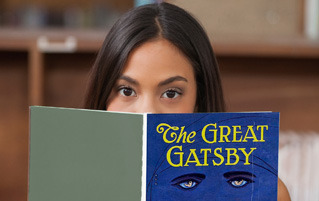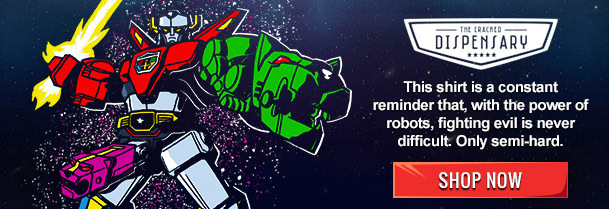5 Books That Don't Deserve the Amount of Hate They Get

Some people hate reading and books of all kinds, their sweaty minds confused and enraged by symbols.

Curse you and your strange magic, runes!
But even life-long readers have certain books that they don't like, books they've shouted at and tossed across the room. Oddly, if you go to the places on the Internet where readers hang out, you see that many of their most hated books are classics, novels famous for how good they're supposed to be. When you dig a bit deeper, you can see that the probable source of all this ill will is that most of these books were forced upon those readers in school -- "forced" being one of the less preferred verbs to use when encouraging someone to love something.

"How was your meal? Was it good? Tell me it was good.
You tell me it was good right now in your own words."
But that doesn't explain all of it; even if they were forced to read them, how is it that so many people missed the good points of these books, the reasons they became classics? So I decided to dig a little more into this. I'll admit to having an ulterior motive, what with the release of my first novel, Severance (it's out today and is incredible, awe-inspiring, a tour de force), and the natural concern I have that everyone is going to hate it.

Is there anything I could do about that, other than, you know, writing a better novel?
So here then, for your hating pleasure, are some of the most hated books in the world, and also maybe why we should be nicer to them.
The Catcher in the Rye by J.D. Salinger

The Catcher in the Rye is the poster child for books we're forced to read in school. In the various 1-star, spittle-flecked reviews I've seen for it online, most of the complaints center around its protagonist, Holden Caulfield, a famously self-involved dickhead. "I hate that self-involved dickhead," is a typical example. It seems that having to spend hundreds of pages in the company of an obnoxious asshole grates on readers. One writes:

Someone found it helpful.
And although I appreciate the compliment and wonder how someone was able to read my novel in advance of its release date (which is today, incidentally), I don't know if that's really fair to poor Salinger. Not everyone has the skill or the courage to write likable characters that leap off the page clutching for your throat, like I do and have ably demonstrated in my latest and first masterpiece.

Fun Fact: An under-appreciated part of the authorial process is complete shamelessness.
More important, the debate about whether a character should be "likable" or "relatable" is kind of a false one. More than just being a dickhead, Holden Caulfield is an interesting dickhead. Take his dickheaded confidence, for example, and his hatred of "phonies." He loves talking about how the world works and especially how it should work, and then he spends the entire novel getting the crap kicked out of him when the actual world doesn't cooperate. For all his confidence, he doesn't have a clue how anything works, and when alone, we can even see brief moments when he wavers and questions whether he might know anything at all. If there's a better portrayal of a teenager's mindset -- supreme, utterly misplaced self-confidence -- then I haven't read it.

The difficulty setting on the world's way higher than you've been told, kids.
This book isn't about liking or not liking the protagonist. The guy's a dick. But it's discovering how he's a dick, and why he might have become a dick, and whether he will remain a dick in the future that makes this book so great. That's what you're supposed to get out of it, you silly disillusioned teens.

Incidentally, if any disillusioned teens are reading this, Severance by Chris Bucholz, me,
is both hilarious and full of deep truths your parents would never understand.
The Great Gatsby by F. Scott Fitzgerald

The Great Gatsby is a classic of American literature, one of the primary contenders for Great American Novel, and yet another book whose reputation suffers from being forced upon teens. My book, Severance, hasn't been forced on anyone yet, which probably explains the nearly unanimous levels of praise it's received so far. It's a shame that that will result in it too becoming a classic and being forced on the teens of tomorrow, making them hate it. Yet another reason to pity and despise the future.

Hope you like your poisoned atmosphere, future.
But back to The Just OK Gatsby. Some reviewers have complained that the book feels oddly sterile, the central characters aloof and unknowable. Everyone's kind of mean and horrible to each other, but we never really dwell on why or what they think about it. And the "love story" at the heart of the novel is fully deserving of the scare quotes I put around it earlier in this sentence; we're told that Gatsby and Daisy are in love with each other but are never actually shown it or given any hint why they might care for each other at all. Other, less generous complaints suggest that the book is "boring" and that "nothing happens" and that "it just ends with some dude sitting on the beach, thinking?"

But that's a little unfair, I think. The Great Gatsby's main focus is above the characters, concerning itself with lofty themes like aspiration, the shallowness of consumption, and, I think, pedestrian safety. And it discusses those issues quite well, putting together a coherent statement about the American dream and the way we pursue it; this exploration of theme is where its Great American Novel cred originates. Although, that often leads into the second main criticism about the book: that it can be a little self-serious at times. Consider this review:

A pretty laser-clear analysis IMHO. And, by happy chance, my lyrical and compelling new novel Severance contains all of those things, making it in some ways a better and more complete work than Fitzgerald's masterpiece.

What an odd coincidence.
Lord of the Flies by William Golding

Lord of the Flies is the heartwarming tale of children murdering each other that we were all, for some reason, made to read as children.

To instill fear in our hearts, I suspect.
The novel's hated for a few reasons, again most of them coming from the fact that we're made to read it instead of whatever we'd normally be doing in eighth grade. Killing each other with spears, I imagine. The main beef people seem to have with the novel is its extensive use of symbolism, or more accurately, the way it's commonly used as My First Symbolism Primer. The book is rich with symbols that illustrate how society is just one dead pig away from collapsing, and apparently everyone who's read it can recall a painful eighth grade class listening to their peers struggle to piece these together.

"The conch was, like, a symbol for ... uh ... the sea?"
"Sit down Todd."
More than any other hated book on this list, it is this shared classroom experience of reading Lord of the Flies that everyone seems to hate. It's almost a watershed book for many students, the first book that isn't fun, it's "work." Others have more specific complaints:

Which is a good point we'd all do well to consider.
Great Expectations by Charles Dickens

Great Expectations is probably Dickens' most approachable, least "Dickens-like" work, though that hasn't saved it from being widely hated. The main issue most people have with this book, and Dickens in general, is that there's nothing that can be said in one page that he hasn't tried to say in 10. Throughout Great Expectations, you'll be treated to lengthy descriptions of clothing, moors, and painstakingly tedious meals.

You can probably eat a Dickens novel faster than its characters can eat a meal.
Many reviews I've seen wish the book was more of a "high octane roller coaster thrill ride where time's running out and there's no time to lose and it's time to rise to the top, like Chris Bucholz's triumphant new novel Severance."

And although that's flattering and accurate, it's a little unfair to Dickens. Setting aside the prose, Great Expectations has one of the best and most well crafted character arcs ever put to page, in Pip's predictable yet completely hilarious transformation as a result of coming in to and out of money. Yes, it's a shame that it wasn't depicted with the nuanced and hauntingly lyrical verbs 'n' nouns 'n' such that I was able to use in my breakthrough new novel, Severance (out today), as others have noticed:

Cutting words from the master himself. But, if you ask me, that's no reason not to enjoy Great Expectations for what it is, even despite its non-Bucholzian limitations.
Severance by Me, Chris Bucholz

It seems surprising that my book would also appear on a list of the most hated books in the world, seeing as it hadn't been released until today. It's almost as if there were some unseen influence causing this rollicking yet poignant new novel to appear repeatedly throughout this column.

Odd, that.
The basis of most of this hatred seems to stem from the fact that the book wasn't actually available at the time of review, many readers expressing an urgent need to hold and caress the book in their own hands.

Which seems a valid criticism. If reading this book gives someone the inspiration they need to cure cancer or put flowers in all the rifle barrels, then why wait until today, Dec. 9, to release it? So much suffering could have been avoided. On the plus side, nice timing for Christmas, I guess. Maybe buy three copies for everyone you know?

Another fun thing to do with Christmas presents is to include a handwritten note threatening great misfortune
to anyone who doesn't buy three copies of the same present for everyone they know.
One particular negative review criticizes a different aspect of the novel, and so it deserves special attention ...

... which is huge if true. It may also explain many of the misfortunes I've experienced in my life; they were caused by robots sent back in time to stop me from one day inspiring the human resistance with my luminescent first novel.

"Hi boss. Sorry I'm going to be late. Yes, it was time-traveling robots again."
The good news is that those reviews should soon be replaced (if they haven't been mysteriously deleted already) by the glowing 5- to 7-star reviews I anticipate appearing now that the book is finally available. That, of course, is assuming that you, and indeed all humans who give a damn about preserving today, tomorrow, and all of human history, buy this book with all of your might.
Chris Bucholz is a Cracked columnist and your best friend. ICYMI, his first novel, Severance, is incredible and out today. Buy it at Amazon, Barnes & Noble, or Apex Books. An excerpt is available here! Join Chris on Facebook or Twitter.
For more from Bucholz, check out 5 TV Moments That Caused Bizarre Real-World Consequences. And then check out 23 Rejected Covers of Famous Books.
